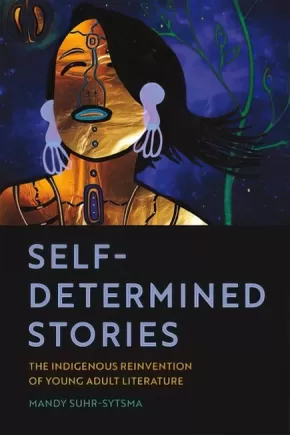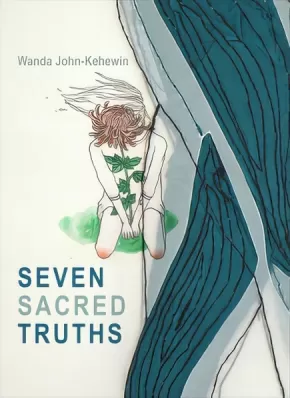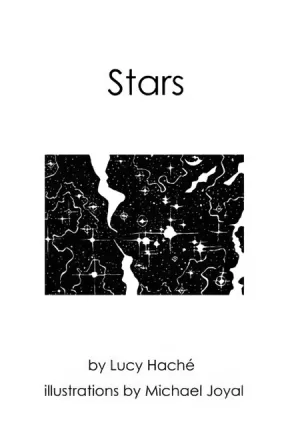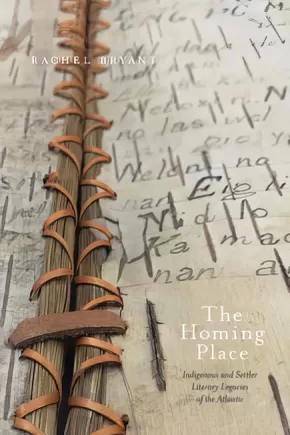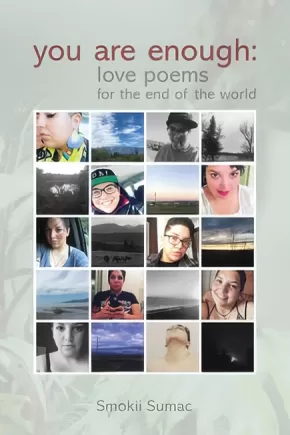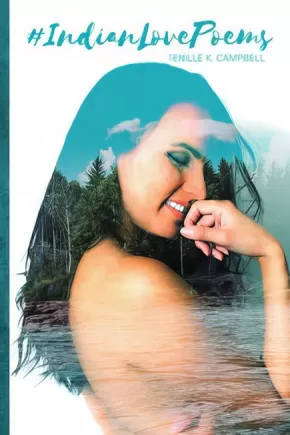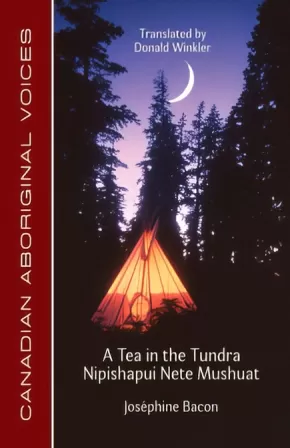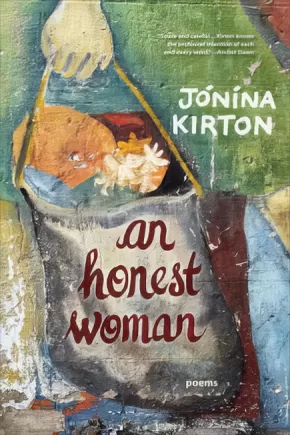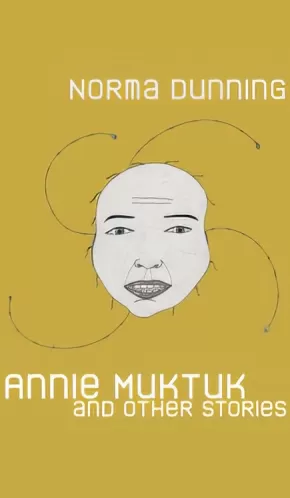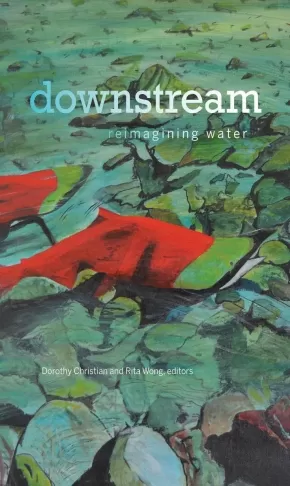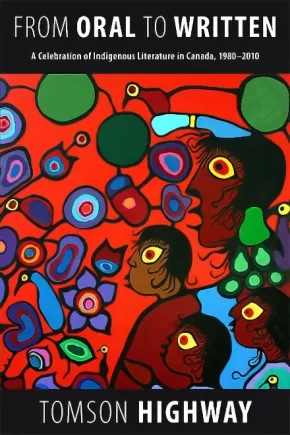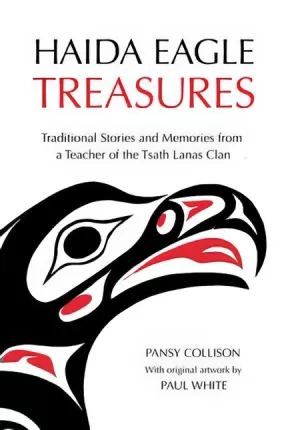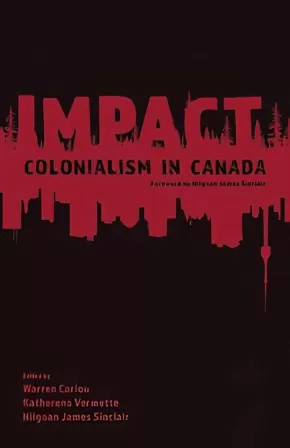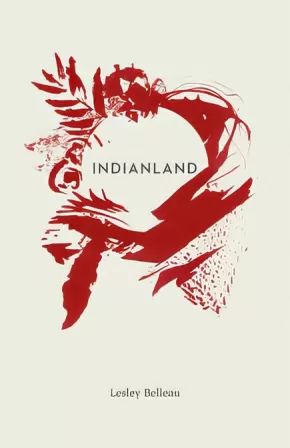
Literary Studies
271
-
285
of
325 Results;
Sort By
Go To
of 22
Self-Determined Stories: The Indigenous Reinvention of Young Adult Literature
$29.95
Format:
Paperback
Text Content Territories:
Indigenous American; Indigenous Canadian;
Grade Levels: University/College;
ISBN / Barcode: 9781611862980
Synopsis:
Synopsis:
Reimagining Indigenous empowerment.
The first book of its kind, Self-Determined Stories: The Indigenous Reinvention of Young Adult Literature reads Indigenous-authored YA-from school stories to speculative fiction-not only as a vital challenge to stereotypes but also as a rich intellectual resource for theorizing Indigenous sovereignty in the contemporary era.
Building on scholarship from Indigenous studies, children’s literature, and cultural studies, Suhr-Sytsma delves deep into close readings of works by Sherman Alexie, Jeannette Armstrong, Joseph Bruchac, Drew Hayden Taylor, Susan Power, Cynthia Leitich Smith, and Melissa Tantaquidgeon Zobel. Together, Suhr-Sytsma contends, these works constitute a unique Indigenous YA genre. This genre radically revises typical YA conventions while offering a portrayal of Indigenous self-determination and a fresh critique of multiculturalism, heteropatriarchy, and hybridity. This literature, moreover, imagines compelling alternative ways to navigate cultural dynamism, intersectionality, and alliance-formation.
Self-Determined Stories invites readers from a range of contexts to engage with Indigenous YA and convincingly demonstrates the centrality of Indigenous stories, Indigenous knowledge, and Indigenous people to the flourishing of everyone in every place.
Contents
Introduction
Ch. 1: A Rebel with a Community, Not Just Cause: Revising YA Power Dynamics and Uniquely Representing Indigenous Sovereignty in Jeannette Armstrong's Slash
Ch. 2: Indigenous School Stories: Alternatives to Multiculturalism in Sherman Alexie's The Absolutely True Diary of a Part-Time Indian and Joseph Bruchac's The Heart of a Chief
Ch. 3: Not Your Father's Pocahontas: Cynthia Leitich Smith's and Susan Power's Resistive Romance
Ch. 4: That's One Story: Reworking Hybridity through Melissa Tantaquidgeon Zobel's and Drew Hayden Taylor's Speculative Fiction
Coda: Alexie's Flight, Zobel's Wabanaki Blues, and the Future of Indigenous YA Literature
Additional Information
214 pages | 6.00" x 9.00"
Seven Sacred Truths
$18.95
Format:
Paperback
Text Content Territories:
Indigenous Canadian; First Nations;
ISBN / Barcode: 9781772012132
Synopsis:
Synopsis:
Seven Sacred Truths explores the perspective of an Indigenous Woman on a continuous journey of healing from trauma.
Seven Sacred Truths presents a powerful exploration of an Indigenous woman's healing journey. Seeing the world through "brown" eyes, poet Wanda John-Kehewin makes new meaning of the past, present, and future through a consideration of Love, Wisdom, Truth, Honesty, Respect, Humility, and Courage. By sharing her views on these Seven Sacred Truths and what they meant to her growing up, John-Kehewin instigates a therapeutic process of restoration and transformation. Her Seven Sacred Truths uncovers new meaning in the written word - meaning that can be shared with others who have lived trauma or who want insight into it. John-Kehewin strives to create a safe space and provide the opportunity to experience another perspective; she invites readers to embark on their own healing journeys. The closer you are to the truth, she writes, the freer you become.
Wanda John-Kehewin uses writing as a therapeutic medium to understand and respond to the near-decimation of First Nations cultures and traditions.
Educator Information
Recommended in the Canadian Indigenous Books for Schools 2019-2020 resource list for grades 10 to 12 for English Language Arts.
Additional Information
120 pages | 5.50" x 8.50"
Stars
$19.95
Artists:
Format:
Paperback
Text Content Territories:
Indigenous Canadian; First Nations; Kwakwaka'wakw (Kwakiutl);
ISBN / Barcode: 9781988168104
Synopsis:
Synopsis:
In this second installation of the Overhead Series, Lucy Haché once again transports the reader with intimate revelations on identity by exploring both her personal and ancestral relationship to the sky and stars. Hache's prose is extraordinary in its combination of self-awareness yet unselfconscious honesty and skillful restraint, creating a sense of connection under the vastness of the stars above. Masterfully illustrated by artist Michael Joyal, his evocative astronomic drawings contribute to the overall sensory and transcendent experience.
Reviews
"[Hache] uses the stars to remember not only the tribulations of the past - Residential Schools and the loss of her traditional village - but also to remember the happiness of her grandmothers and to remember her language. Her poetic prose if full of imagery so rich that the reader can feel swept away with the power of the language." - Canadian Indigenous Books for Schools 2018-2019
"Indigenous People have always had a strong relationship with the sky. Here, Joyal's stark, beautiful illustrations combine perfectly with Haché's voice as she sings a story of loss, and ultimately, reclamation." --David A. Robertson, author of When We Were Alone (winner 2017 Governor General's Literary Award) and Strangers
Educator & Series Information
Recommended resource for Grades 8-12 for these subject areas: English Language Arts.
A Kwak'wala language glossary is found at the back of the book.
This book is part of the Overhead Series.
Additional Information
80 pages | 5.50" x 8.50"
The Homing Place: Indigenous and Settler Literary Legacies of the Atlantic
$29.99
Format:
Paperback
Text Content Territories:
Indigenous American; Indigenous Canadian;
Grade Levels: University/College;
ISBN / Barcode: 9781771122870
Synopsis:
Synopsis:
Can literary criticism help transform entrenched Settler Canadian understandings of history and place? How are nationalist historiographies, insular regionalisms, established knowledge systems, state borders, and narrow definitions continuing to hinder the transfer of information across epistemological divides in the twenty-first century? What might nation-to-nation literary relations look like? Through readings of a wide range of northeastern texts – including Puritan captivity narratives, Wabanaki wampum belts, and contemporary Innu poetry – Rachel Bryant explores how colonized and Indigenous environments occupy the same given geographical coordinates even while existing in distinct epistemological worlds. Her analyses call for a vital and unprecedented process of listening to the stories that Indigenous peoples have been telling about this continent for centuries. At the same time, she performs this process herself, creating a model for listening and for incorporating those stories throughout.
This commitment to listening is analogous to homing – the sophisticated skill that turtles, insects, lobsters, birds, and countless other beings use to return to sites of familiarity. Bryant adopts the homing process as a reading strategy that continuously seeks to transcend the distortions and distractions that were intentionally built into Settler Canadian culture across centuries.
Reviews
"The Homing Place enacts and advocates for a paradigm shift in ‘literary relations’ in North America, revealing the ’invisible wall ’ in colonial perceptions that may at first seem as impermeable as the nation-state borders that divide the continent. Yet just as Indigenous people and homelands have always traversed those borders, so may our readings transcend that wall. Rachel Bryant foregrounds and leads us to acknowledge the active ways our embodied minds evade or engage Indigenous contexts and communities, producing greater awareness of the impacts of our activities as readers and writers, Native people and settlers, those who make policy, and those who are most impacted by it.”— Lisa Brooks
“Bryant’s excavation of US and Canadian exceptionalisms could not be timelier. She shows how Anglo-Atlantic writing has built a ‘system of self-protection’ that has sought to contain Indigenous geographies and indeed Indigenous agency. At the same time, she shows how First Nations have always effectively written back against this system. This book shines new light on settler colonialism and Indigenous resurgence, historic and contemporary, through sharp analyses of some influential but lesser-discussed writers. It belongs on the shelf of every scholar in Indigenous Studies, Canadian Studies, American Studies, Atlantic and Maritime Studies, Material Culture Studies, Cultural Geography, and Literary Criticism, for it creates fresh new dialogues among all of these fields and interests.”— Siobhan Senier
"If you are interested in Indigenous affairs, the history of how the eastern tribes came to be in such dire straits today, and how literature has reflected these changes – and even attempts to embrace and effect change for the better – then The Homing Place will certainly appeal to you."— The Miramichi Reader
Awards
- 2017 Writers’ Federation of New Brunswick Book Award for Non-Fiction winner
- 2018 AUP Book Jacket and Journal Show Selected Entry joint winner
Additional Information
256 pages | 6.00" x 9.00"
you are enough: love poems for the end of the world
$15.00
Format:
Paperback
Text Content Territories:
Indigenous Canadian; First Nations; Ktunaxa (Kootenay);
ISBN / Barcode: 9781928120162
Synopsis:
Synopsis:
In his debut poetry collection you are enough: love poems for the end of the world, Smokii Sumac has curated a selection of works from two years of a near daily poetry practice. What began as a sort of daily online poetry journal using the hashtag #haikuaday, has since transformed into a brilliant collection of storytelling drawing upon Indigenous literary practice, and inspired by works like Billy Ray Belcourt's This Wound is a World, and Tenille Campbell's #IndianLovePoems.
The poems follow the haiku format, often stringing together three lines to tell a story. With sections dealing with recovery from addiction and depression, coming home through ceremony, and of course, as the title suggests, on falling in and out of love, Sumac brings the reader through two years of life as a Ktunaxa Two-Spirit person. This collection will move you as Sumac addresses the grief of being an Indigenous person in Canada, shares timely (and sometimes hilarious) musings on consent, sex, and gender, introduces readers to people and places he has loved and learned from, and through it all, helps us all come to know that we are enough, just as we are.
Awards
- 2019 Indigenous Voices Awards Winner for Published Poetry in English
Additional Information
108 pages | 5.50" x 8.50"
#IndianLovePoems
$17.95
Format:
Paperback
Text Content Territories:
Indigenous Canadian;
ISBN / Barcode: 9781927426999
Synopsis:
Synopsis:
Covering Indigenous adventures from Wahpole Island to Northern Saskatchewan to the coast of Vancouver, #IndianLovePoems is a poetry collection that delves into the humour and truths of love and lust within Indigenous communities. Sharing stories in search of The One, or even better, that One-Night-Stand, or the opening of boundaries -- can we say medicine wheel -- this collection fearlessly sheds light on the sharing and honesty that comes with discussions of men, women, sex, and relationships, using humour to chat about the complexities of race, culture and intent within relationships. From discovering your own John Smith to sharing sushi in bed, #IndianLovePoems will make you smile, shake your head, and remember your own stories about that special someone.
Reviews
"These are resolutely modern poems written for the great variety of women and LGBTQ2S people of today. They turn the stereotypes of the “Vanishing Indian” and “unchanging cultures” upside down with mentions of campus life, sexting, Tinder, and of course Twitter (the poems have non-serialized numbers with hashtags). There is power in Campbell’s creative use of imagery and everyday language. #IndianLovePoems is a must-read from a very exciting new voice who will undoubtedly become an established name." - Sylvie Vranckx, Canadian Literature: A Quarterly of Criticism and Review
Additional Information
96 pages | 6.00" x 9.00"
A Tea in the Tundra / Nipishapui Nete Mushuat
$16.95
Format:
Paperback
Text Content Territories:
Indigenous Canadian; First Nations; Innu (Montagnais-Naskapi);
Grade Levels: 12; University/College;
ISBN / Barcode: 9781772310351
Synopsis:
Synopsis:
In this bilingual English-Innu poetry collection, Joséphine Bacon challenges our traditional notions of culture and perception, landscape and wilderness, the limits of experience, and the nature of human being. With a surreal blend of emotions and memories, A Tea in the Tundra / Nipishapui Nete Mushuat portrays a complex and ever-shifting landscape of possibilities. The author passionately reveals a finely wrought sensibility, which elevates the subtle scenery of life's everyday events.
Educator & Series Information
This book is part of the Canadian Aboriginal Voices series.
Additional Information
96 pages | 5.50" x 8.50" | Translated by Donald Winkler
An Honest Woman
$16.95
Format:
Paperback
Text Content Territories:
Indigenous Canadian;
ISBN / Barcode: 9781772011449
Synopsis:
Synopsis:
An Honest Woman by Jonina Kirton confronts us with beauty and ugliness in the wholesome riot that is sex, love, and marriage. From the perspective of a mixed-race woman, Kirton engages with Simone de Beauvoir and Donald Trump to unravel the norms of femininity and sexuality that continue to adhere today.
Kirton recalls her own upbringing, during which she was told to find a good husband who would “make an honest woman” out of her. Exploring the lives of many women, including her mother, her contemporaries, and well-known sex-crime stories such as the case of Elisabeth Fritzl, Kirton mines the personal to loosen the grip of patriarchal and colonial impositions.
An Honest Woman explores the many ways the female body is shaped by questions that have been too political to ask: What happens when a woman decides to take her sexuality into her own hands, dismissing cultural norms and the expectations of her parents? How is a young woman’s sexuality influenced when she is perceived as an “exotic” other? Can a woman reconnect with her Indigenous community by choosing Indigenous lovers?
Daring and tender in their honesty and wisdom, these poems challenge the perception of women’s bodies as glamorous and marketable commodities and imagine an embodied female experience that accommodates the role of creativity and a nurturing relationship with the land.
Reviews
“Jonina Kirton is courageously honest about her life experiences as a female of Indigenous and immigrant ancestry. Many poems resonate deeply, as we identify with her personal quest to figure out who she is, and the unacceptable things done to her. Her raw honesty is unsettling and uncomfortable, because it can be our truth too. Her poems depict devaluation and dehumanization, grieving, lessons learned. Her poems offer important insights as to why there are thousands of missing and murdered Indigenous women.” — Senator Lillian E. Dyck
“When writing from the voice of between, writer and reader have no place to hide. Assumptions and camouflage fall away. Murdered, missing, and violated women and girl voices have been silenced. The story lethally repeats. Kirton picks over how she was raised familially and culturally like a crime scene. Too, she affirms, ‘I have been here forever and I will rise again and again.’ Tough, eloquent, revelatory, these poems are the very ones we are desperately in need of.” — Betsy Warland, author of Oscar of Between: A Memoir of Identity and Ideas
“I’m sure people have been looking at me strangely every time I gasp, but I can’t glance away from the page for even a second to notice. Some of the poems end sharply, with a punch; some deliberately leave me searching for the next line; others show the repetition of heartbreaking cycles of violence and oppression, but offer a portrayal of resilience, too.” — All Lit Up!
Educator Information
This book would be useful for Women's Studies, Creative Writing, English Language Arts, Poetry, and English courses. Recommended for grades 11-12 and university-college students.
Please be advised, this book contains explicit sexual references and references to sexual and physical abuse.
Additional Information
104 pages | 6.00" x 9.00"
Annie Muktuk and Other Stories
$22.99
Format:
Paperback
Text Content Territories:
Indigenous Canadian; Inuit;
Grade Levels: University/College;
ISBN / Barcode: 9781772122978
Synopsis:
Synopsis:
I woke up with Moses Henry’s boot holding open my jaw and my right eye was looking into his gun barrel. I heard the slow words, “Take. It. Back.” I know one thing about Moses Henry; he means business when he means business. I took it back and for the last eight months I have not uttered Annie Mukluk’s name.
In strolls Annie Mukluk in all her mukiness glory. Tonight she has gone traditional. Her long black hair is wrapped in intu’dlit braids. Only my mom still does that. She’s got mukluks, real mukluks on and she’s wearing the old-style caribou parka. It must be something her grandma gave her. No one makes that anymore. She’s got the faint black eyeliner showing off those brown eyes and to top off her face she’s put pretend face tattooing on. We all know it’ll wash out tomorrow. — from "Annie Muktuk"
When Sedna feels the urge, she reaches out from the Land of the Dead to where Kakoot waits in hospital to depart from the Land of the Living. What ensues is a struggle for life and death and identity. In “Kakoot” and throughout this audacious collection of short stories, Norma Dunning makes the interplay between contemporary realities and experiences and Inuit cosmology seem deceptively easy. The stories are raucous and funny and resonate with raw honesty. Each eye-opening narrative twist in Annie Muktuk and Other Stories challenges readers’ perceptions of who Inuit people are.
Awards
- 2017-2018 Danuta Gleed Literary Award Winner
- 2018 INDIEFAB Book of the Year (Short Stories)
- 2018 Howard O'Hagan Award for Short Story
Reviews
"Dunning’s stories, nuanced and deeply felt, reach deep into the heart of what it means to be Inuit, into the sacred place where the songs of the north are still sung, visions are still seen, and the spirits still speak. From this place, it is possible to laugh at those who come to destroy. From this place, dignity is maintained and the connection to the turning of the seasons is unbroken. Together with grief for what has been lost, there is power and light in these stories." — Kristine Morris, Foreword Magazine, June 2017
"When I read the article, 'What inspired her was getting mad,' about the story behind Norma Dunning’s debut collection, Annie Mukluk and Other Stories, I was not surprised. Acts of justice and revenge factor throughout the book, propelling the stories so terrifically. Dunning wrote her stories in response to ethnographic representations of Inuit people that neglected to show them as actual people, and the result is a book that’s really extraordinary. Because her people are so real, people who laugh, and joke, and drink, and have sex (and they have a lot of sex)." — Kerry Clare, Pickle Me This, August 2017
"Although [Dunning] deals with serious contemporary realities for Inuit people, she manages to work in moments of humour that flesh out her characters, making them fully realized and complex.”— Matthew Stepanic, Where.ca, September 2017
"A successful short story takes us to unfamiliar places, and the 16 stories in this collection certainly fill that bill. It’s a journey deep into Inuit life, with tales of Inuk of all shapes, genders and ages. The title story is at turns funny, violent and cunning: Jimmy tries to convince best friend Moses to stay away from the glorious Annie Muktuk, an arnaluk (naughty woman, according to the glossary) who will cause him grief." — Sarah Murdoch, Toronto Star, November 2017
"This whole collection is fantastic, but the story with the bad trip is 'Husky', inspired by the life of trapper and HBC Factor "Husky" Harris whose visit to Winnipeg with his three Inuit wives, Tetuk, Alaq and Keenaq, is written about in history books. In the story, naturally, the group and their children make an impression at their hotel, and the racism of hotel staff leads to a fight that lands Husky in the hospital. The violence doesn't end there and the women are further victimized—but then they enact the most beautiful justice." — Kerry Clare, 49th Shelf, August 2017
"Inuk writer Norma Dunning’s debut collection passed under the radar of the big awards despite being the year’s best short fiction collection. The stories infuse Inuit myth with reality, explore the effects of colonialism, and delve into settler-writer portrayals of Inuit, all told with heart and humour that is infectious." — Michael Melgaard, National Post, December 2017
Additional Information
198 pages | 5.25" x 9.00"
downstream: reimagining water
$36.99
Format:
Paperback
Text Content Territories:
Indigenous Canadian;
ISBN / Barcode: 9781771122139
Synopsis:
Synopsis:
downstream: reimagining water brings together artists, writers, scientists, scholars, environmentalists, and activists who understand that our shared human need for clean water is crucial to building peace and good relationships with one another and the planet. This book explores the key roles that culture, arts, and the humanities play in supporting healthy water-based ecology and provides local, global, and Indigenous perspectives on water that help to guide our societies in a time of global warming. The contributions range from practical to visionary, and each of the four sections closes with a poem to encourage personal freedom along with collective care.
This book contributes to the formation of an intergenerational, culturally inclusive, participatory water ethic. Such an ethic arises from intellectual courage, spiritual responsibilities, practical knowledge, and deep appreciation for human dependence on water for a meaningful quality of life. downstream illuminates how water teaches us interdependence with other humans and living creatures, both near and far.
Reviews
"Downstream stakes out a bold and creative claim to collaborative and cross-cultural eco-spiritual-neo-traditional knowing and, with it, new approaches to policy and action. A timely read that lends depth and resonance to some of the material and voices [in other books on the subject]." — Heather Menzies, Literary Review of Canada, June 2017
"This rich collection brings together the work of artists, writers, scientists, scholars, environmentalists, and activists, all focusing on the looming global water crisis. ... Writing styles vary from piece to piece throughout the book—poetic, personal, journalistic, and academic—but the shifts between each are well worth navigating for any reader interested in human futures on Earth."— Publishers Weekly, August 2017
"This collection of works successfully expands our knowledge of and experience with water by merging natural science, social science, arts, and humanities approaches to water. It offers new, innovative, and engaging ways to think about and experience water, especially as it relates to life and vitality."— Sara Beth Keough, American Review of Canadian Studies, November -0001
Educator Information
This collection of essays is useful for these course/subject areas or topics: Language Arts & Disciplines; Creative Writing; Indigenous Studies; Poetry; Environmental Studies; Environmental Humanities.
Table of Contents
Introduction: Re-storying Waters, Re-storying Relations / Rita Wong and Dorothy Christian
Part I: Contexts for Knowing and Unknowing Water
1. Planetary Distress Signals / Alanna Mitchell
2. Water / Lee Maracle
3. Interweaving Water: The Incremental Transformation of Sovereign Knowledge into Collaborative Knowledge / Michael D. Blackstock
4. Water and Knowledge / Astrida Neimanis
5. Excerpts from “a child’s fable” / Baco Ohama
Part II: Water Testimonies: Witness, Worry, and Work
6. Water: The First Foundation of Life / Mona Polacca
7. From Our Homelands to the Tar Sands / Melina Laboucan Massimo
8. Keepers of the Water: Nishnaabe-kwewag Speaking for the Water / Renee Elizabeth Mzinegiizhigo-kwe Bedard
9. Water Walk Pedagogy / Violet Caibaiosai
10. A Response to Pascua Lama / Cecilia Vicuna
Part III: Shared Ethical and Embodied Practices
11. Moving with Water: Relationship and Responsibilities / Alannah Young Leon and Denise Marie Nadeau
12. Bodies of Water: Meaning in Movement / Seonagh Odhiambo Horne
13. Upstream: A Conversation with Water / Cathy Stubington
14. Ice Receding, Books Reseeding / Basia Irland
15. Tsunami Chant / Wang Ping
Part IV: A Respectful Co-existence in Common: Water Perspectives
16. Listening to the Elders at the Keepers of the Water Gathering /Radha D’Souza
17. Coastal Waters in Distress from Excessive Nutrients / Paul J. Harrison
18. Bodies of Water: Asian Canadians In/Action with Water /Janey Lew
19. Permeable Toronto: A Hydro-Eutopia / Janine MacLeod
20. Saturate/Dissolve: Water for Itself, Un-Settler Responsibilities, and Radical Humility / Larissa Lai
21. Bring Me Back / Janet Rogers
Additional Information
300 pages | 6.00" x 9.00"
From Oral to Written: A Celebration of Indigenous Literature in Canada, 1980-2010
$35.00
Format:
Paperback
Text Content Territories:
Indigenous Canadian;
ISBN / Barcode: 9781772011166
Synopsis:
Synopsis:
Aboriginal Canadians tell their own stories, about their own people, in their own voice, from their own perspective.
If as recently as forty years ago there was no recognizable body of work by Canadian writers, as recently as thirty years ago there was no Native literature in this country. Perhaps a few books had made a dent on the national consciousness: The Unjust Society by Harold Cardinal, Halfbreed by Maria Campbell, and the poetry of Pauline Johnson and even Louis Riel. Now, three decades later, Native people have a literature that paints them in colours that are psychologically complex and sophisticated. They have a literature that validates their existence, that gives them dignity, that tells them that they and their culture, their ideas, their languages, are important if not downright essential to the long-term survival of the planet.
Tomson Highway’s From Oral to Written is a study of Native literature published in Canada between 1980 and 2010, a catalogue of amazing books that sparked the embers of a dormant voice. In the early 1980s, that voice rose up to overcome the major obstacle Native people have as writers: they are not able to write in their own Native languages, but have to write in the languages of the colonizer, languages that simply cannot capture the magic of Native mythology, the wild insanity of Trickster thinking. From Oral to Written is the story of the Native literary tradition, written – in multiple Aboriginal languages, in French, and in English – by a brave, committed, hard-working, and inspired community of exceptional individuals – from the Haida Nation on Haida Gwaii to the Mi’kmaq of Nova Scotia’s Cape Breton Island.
Leading Aboriginal author Tomson Highway surveys the first wave of Native writers published in Canada, highlighting the most gifted authors and the best stories they have told, offering non-Native readers access to reconciliation and understanding, and at the same time engendering among Native readers pride in a stellar body of work.
Reviews
“We gratefully acknowledge the work of those artists who have come before, and those that continue, building bridges across our cultures through their authentic words. Tomson Highway’s readings each demonstrate that within our stories, we pass along our teachings and we build upon the strength inside each one of us. We are arriving. Back to our lands, back to our stories, back to our truths, unwrapping old words and sharing wisdom. We, are coming home.” —Terri Mack, Strong Nations
“A rich compilation of Indigenous literature that will be a gift for Canadian school curriculums, also well suited for those Canadians in search of understanding and reconciliation. More importantly this book is what Indigenous people need because, like me, they will discover their lives in the many stories. If I had this as a teenager, I would have understood that I was not alone in the darkness I lived. I would have seen that others found a way out. Bravo, Tomson Highway!” ―Bev Sellars, author of They Called Me Number One: Secrets and Survival at an Indian Residential School and Price Paid: The Fight for First Nations Survival
Educator Information
Recommended in the Canadian Indigenous Books for Schools 2019-2020 resource list as a Teacher Resource.
Additional Information
|
Haida Eagle Treasures: Traditional Stories and Memories from a Teacher of the Tsath Lanas Clan
$24.95
Artists:
Format:
Paperback
Text Content Territories:
Indigenous Canadian; First Nations; Haida; Eagle Clan (Ts'aahl);
ISBN / Barcode: 9781550597486
Synopsis:
Synopsis:
Take a journey into the heart of Haida culture as it is lived and experienced by an extraordinary woman of the Tsath Lanas Eagle Clan. Pansy Collison, a Haida woman born and raised in Old Massett on Haida Gwaii, tells stories of her clan and community, as well as personal narratives about her history and family. Haida Eagle Treasures embodies a strong Haida woman’s voice, offering a rare glimpse inside Haida culture. Each story and memory is a treasure that captures part of the beauty of the Haida worldview and way of life.
Now retired, Pansy taught for 23 years at elementary, secondary, and college levels. From these experiences, she describes some of the challenges and contradictions of living between two worlds. Pansy’s teaching skills, artistic talents, and political affiliations keep her involved in politics and education on Haida Gwaii.
Thirteen original illustrations by Pansy’s brother, Paul White, a gifted artist, teacher, pole carver and designer, provide the guideposts within Haida Eagle Treasures.
Educator Information
Recommended in the Canadian Indigenous Books for Schools 2019-2020 resource list as being useful for grades 8-12 for English Language Arts and Social Studies.
Caution: use of the term "Native" throughout.
Additional Information
244 pages | 6.00" x 9.00" | 2nd Edition
Impact: Colonialism in Canada
$12.00
Format:
Paperback
Text Content Territories:
Indigenous Canadian;
Grade Levels: 12; University/College;
ISBN / Barcode: 9781927849293
Synopsis:
Synopsis:
A collection of fiction, poetry, essays and creative non-fiction, this anthology features works by over 20 Indigenous Canadian writers. The book focuses on the effects of colonialism in Canada from both historical and contemporary perspectives.
"These stories are rich in geographies Indigenous peoples journey through today; on streets, in cities, and into the future. These stories will make you think, cry, and heal." —Niigaanwewidam James Sinclair, Editor
Reviews
"Impact: Colonialism in Canada presents writings that are often challenging, thought-provoking, and at times, gut-wrenching. The collection is a testament to strength and resiliency and the potential for healing, both within the Indigenous and non-Indigenous communities. But, it is not easy reading; it demands considerable insight, open-mindedness, and an understanding of an historical concept (i.e. colonialism), all of which point to the book’s being read and/or studied by students in the upper grades of high school. It’s certainly a work that would be a fine reference in a high school library collection, and teachers would find it to be an excellent supplemental text for the study of Aboriginal writers, as well as Canadian history, particularly as a reflection of the impact of colonialism upon Canada’s Indigenous peoples. Highly Recommended." - Joanne Peters, CM Magazine
Educator Information
Recommended for ages 17+
Additional Information
198 pages | 5.50" x 8.50"
Indianland
$18.95
Format:
Paperback
Text Content Territories:
Indigenous Canadian; First Nations; Anishinaabeg; Ojibway;
ISBN / Barcode: 9781894037921
Synopsis:
Synopsis:
Indianland is a rich and varied poetry collection. The poems are written from a female and Indigenous point of view and incorporate Anishinaabemowin throughout. Time is cyclical, moving from present-day back to first contact and forward again. Themes of sexuality, birth, memory, and longing are explored, images of blood, plants (milkweed, yarrow, cattails), and petroglyphs reoccur, and touchstone issues in Indigenous politics are addressed (Elijah Harper, Murdered and Missing Indigenous Women, forced sterilizations, Oka).
Educator Information
Recommended in the Canadian Indigenous Books for Schools 2019-2020 resource list as being useful for grades 11 and 12 for these subjects: English Language Arts, Media Studies, and Social Studies.
This work includes sexual content, references to rape, and mature content.
Additional Information
80 pages | 5.50" x 8.50"
Little Athapapuskow: A Métis Love Story (4 in stock, Out of Print)
$20.00
Artists:
Format:
Paperback
Text Content Territories:
Indigenous Canadian; Métis;
ISBN / Barcode: 9781926795829
Synopsis:
Synopsis:
Little Athapapuskow is collection of poems named after a lake Guy Freedman grew up on near Flin Flon, Manitoba. They represent his efforts to challenge Catholicism and its complicity with the Confederation project, which dismantled the New Nation developing in the Canadian Northwest. The poems are organized into three parts—past, present, and future—and they address the inter-generational impacts of the Church on his family in relation to the doctrine of the Holy Trinity. This book is his love song to his home and to his country.
Educator Information
Recommended resource for Grades 10-12 English Language Arts and Social Studies.
Contains poems about the history of the Métis people, family, love, celebration of culture, colonialism, religion, violence.
Caution: Some poems contain strong language and mature subject matter, such as discussions of violence, alcoholism, and sexuality.
Additional Information
86 pages | 7.25" x 5.75 "
Sort By
Go To
of 22

